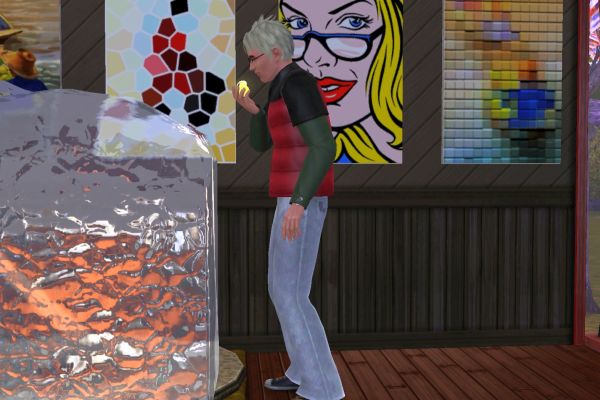
My self-sim eating a lifefruit. There is a deeper meaning to this, if you want there to be.
There is a reason I have categorized this entry as both “games” and “philosophy”. This happens occasionally with me, and you may be curious as to how that happens.
In the computer game The Sims 3, there is a plant called Lifefruit. It is a narrow bush that produces two fruits every few days (depending on the quality and care). When an adult eats one fruit, they become one day younger. Since the default lifespan for a sim is something like 80 days, that’s a pretty big deal. It is particularly the fertile years that could need an extension – teen age is unnaturally long but the adult years are short if you want more than a couple kids, not to mention a career. (In recent updates of the game, you can set the length of individual age groups, which helps with this problem.)
Sims with the “Good” trait can receive lifetime happiness by donating to good causes, and one of the causes I have supported the most is “Lifefruit for elders”. It just seemed like the right thing to do, you know?
Sims with a high gardening skill (level 7 and up) can grow this plant from special seeds that can be found occasionally. It can not be bought. Once in a blue moon you will get a request from an elderly sim (one of the computer-controlled ones) who feels that they are nearing the end of their life, and wants to buy a lifefruit from you. They pay handsomely for it and their your relationship with them goes way up. For as long as it lasts…
I’ve played the game off and on since it came out, but only just recently did I actually play an elder with a lifefruit garden. It turns out that once you have passed the age marker from adult to elder, lifefruit no longer has any effect. The exception is toward the end of your years as an elder – it will then age you several days, taking you to the brink of death.
***
From this we can learn that meaning well is not the same as doing well, although it usually helps. Sometimes you need knowledge and wisdom along with your love. In real life there is no lifefruit, of course, but it is still possible to donate to causes which may do more harm than good, or at least considerable harm along with their good. NGOs (non-government organizations) are some of the most obscure groups on the planet, frequently being tax-exempt and having no audits and a leadership based on the leaders choosing people they like for the highest positions, including the next leaders. Where your money ends up is generally pretty foggy. And even when the intentions of all involved are pure, we know that meddling in cultures strikingly different form your own can have disastrous side effects.
***
Another lesson from the lifefruit is that you cannot always save up something for later. There are things that belong in one life phase but not in another. It is a well known fact that people often have grand plans for traveling the world when they retire; but when they actually do so, many no longer have the health and the energy and the people with whom they wanted to travel. What once was the dream of their life may end up a nightmare and may even, in a few cases, be the end of them.
On a thankfully much smaller level, I have mentioned before that since 2005 I can no longer eat fatty foods except in tiny quantities: For instance, chocolate about the size of my thumb in one workday. If I had known this in my younger years, you can bet that I would have eaten more chocolate. Well, even more chocolate, I mean. (While not quite as potent as the imaginary lifefruit, chocolate has many health benefits – it increases fat burning and makes exercise more effective, balances sex hormones, improves mood, and contains antioxidants that supposedly reduce the risk of cancer slightly and slows aging.) So dear younger reader: Eat your chocolate while you can, with a grateful heart.
